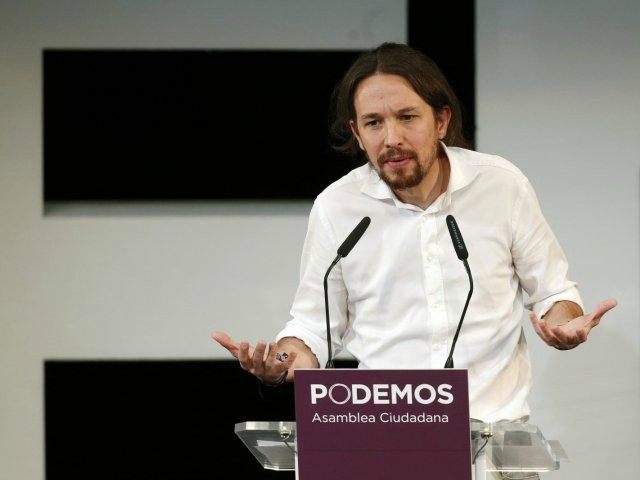The radical leftist party Podemos (“We Can”) that took Spain by storm last year is suffering major poll losses leading into Spain’s parliamentary elections in November; Spanish observers are growing wary of socialism, following the decline of the Greek economy, a new government poll shows.
According to a poll conducted by Spain’s Center for Sociological Investigations (CIS)–a government agency that conducts regular polls before parliamentary elections–both the center-right Popular Party (PP) and the center-left Socialist Workers’ Party (PSOE) have made gains since the last poll conducted in April, which indicates a willingness by the Spain electorate to hold on to the two-party system. The incumbent PP is currently in the lead with 28.2 percent of the vote, with the PSOE coming in second at 24.9 percent.
If the election were held today, Podemos would receive 15.7 percent of the vote, making it the third-most popular party. This represents a significant decline, down 8.2 points since polls in January, when it was the highest-polling party in the country.
The only bright side to this poll for Podemos is that, should a majority party not win the election, those asked said their preferred coalition government would be a Podemos-PSOE government, which received 21.1 percent of the vote. This result may be less of an indication that voters approve of Podemos than it is proof that there are no formidable right-wing third parties in Spain, however, as the PP remains a broad coalition of conservative and classical liberal voters.
Headlines heralding the decline of Podemos began surfacing in June, when a poll commissioned by Spanish newspaper El Pais found support had fallen to 18 percent, with the PSOE in the lead at 23 percent. The poll noted that Podemos was in the lead as recently as April.
In response to the latest poll, Podemos Secretary General Pablo Echenique promised the leadership would turn Podemos into “a totally new party. … I trust that we will see the definitive polling–the election–will say something very different from what the CIS says.”
Reports in June blamed, in part, infighting within Podemos between its leadership–head Pablo Iglesias, a radical leftist professor and television host on Iranian state television–and members who felt they did not want Iglesias in power lest they “swap one elite for another.” While the internal discord within the party did not appear to help, a much more significant international event appears to have triggered the buyers’ remorse among former would-be Podemos voters: the Greek financial crisis.
Upon the election of Alexis Tsipras as Prime Minister of Greece, Podemos’ leadership vocally supported him. “I think that the victory of Syriza will provoke something that’s new in the political panorama of Greece – they’re going to have a real Greek president, not a delegate of Angela Merkel whose interests will rank above those of the country and its people,” Pablo Iglesias said upon Tsipras’ election in January. Tsipras has since imposed even stricter austerity measures than those initially proposed by the EU and IMF on Greece, and Syriza has been reduced to infighting between hardliners who view Tsipras as a traitor and its leadership.
Throughout the crisis, Tsipras has supported Podemos. Europe, Tsipras said recently, “can change” if “forces similar to Syriza” take over Spain, lending his support to Podemos. Podemos officials responded by immediately distancing themselves from the failed Tsipras. “Spain is not Greece. … Greece and Spain are different economies in very different situations which demand different economic strategies,” said Nacho Álvarez, the lead economic mind of Podemos, adding, “Podemos and Syriza have different economic approaches.” He did not specify in what ways the two parties differ.
Even before this rebuke of praise from Tsipras, Podemos strongly condemned the deal that kept Greece from leaving the euro and reverting to the drachma currency. “This agreement was not designed to solve the economic problems (of Greece),” Álvarez said in July. These attempts to divorce Podemos from Syriza have clearly failed in large part, however, as voters begin to edge away from the third-party cliff and return to their incumbent and opposition main parties.

COMMENTS
Please let us know if you're having issues with commenting.